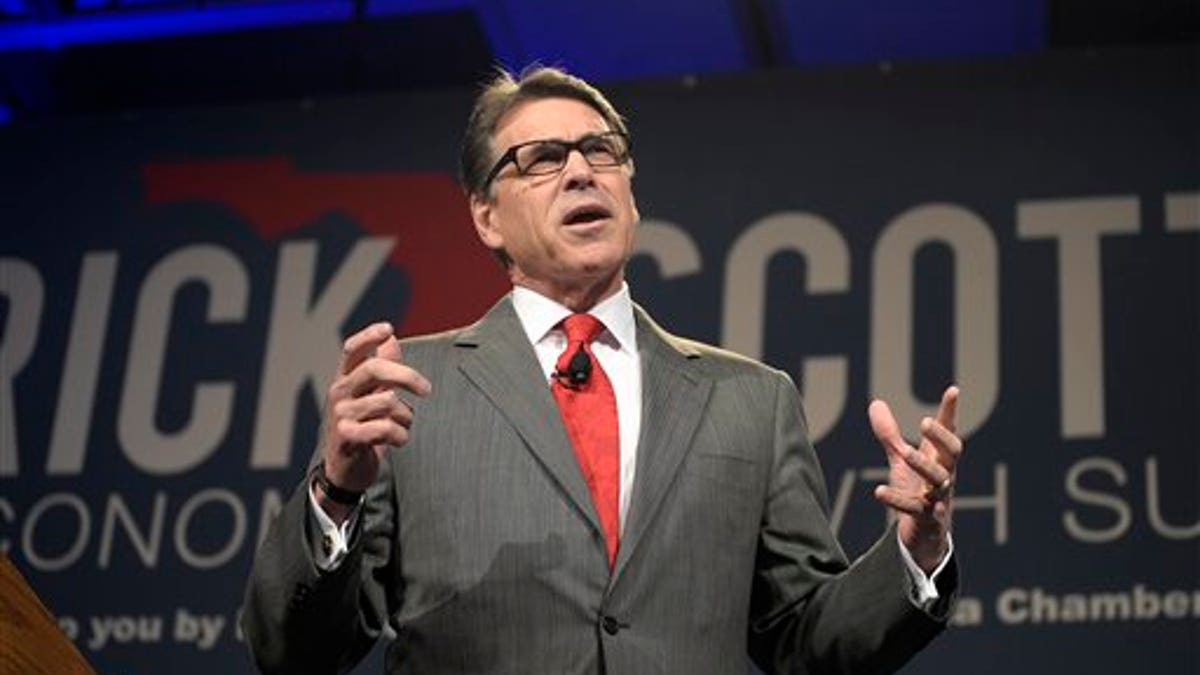
Former Texas Gov. Rick Perry speaks during Rick Scott's Economic Growth Summit in Lake Buena Vista, Fla., Tuesday, June 2, 2015. (AP Photo/Phelan M. Ebenhack)
What is Rick Perry up to?
The former Texas governor looks to be cutting himself out of the conservative herd. He recently blasted his fellow Republicans for losing “our moral legitimacy as the party of Lincoln, as the party of equal opportunity,” by being “content to lose the black vote.”
Perry’s strategy seems incongruous for a man who was embarrassed during the 2012 primaries by the revelation that his family hunting lodge had a racial epithet over the entrance: “N-ggerhead Ranch.” He also remains a champion of voter identification laws, which disproportionately push blacks, Latinos and the young out of the voting booth.
Now, as he runs for the 2016 GOP presidential nomination, Perry claims he is looking to help black people. “We’re a country with Hispanic CEOs, with Asian billionaires, with a black President,” he said in a speech earlier this month. “So why is it, today, so many black families feel left behind? Why is it that a quarter of African-Americans live below the poverty line [even with] food stamps and housing subsidies?
"I’m here to tell you that it’s Republicans, not Democrats, who are truly offering black Americans the hope for a better life…”
Perry promised that if he wins the White House he would send Congress legislation to boost income credits for the working poor. He said the “fundamental reason why Democratic policies have failed to cure poverty is because the only true cure for poverty is a job. And Democratic policies make it too hard for the poor to find a job.”
He also pointed to “zoning laws, environmental regulations” that limit affordable housing. Democrats, he charged, are doing nothing but “throwing money at the problem and walking away,” when it comes to decades of persistent black poverty, failure in school and high rates of incarceration.
Perry’s speech is the most substantial effort by any Republican in a generation to change the politics of race. President Richard Nixon tried his best in the late 1960s when he appointed a record number of black people to federal office, doubled aid to black colleges, increased federal civil rights enforcement — including desegregation of southern schools that had largely remained segregated in the years after the 1954 Brown decision — and pushed affirmative action with Executive Orders to bring blacks into the federal workforce.
Yet Nixon also played on white southern resentment toward the civil rights movement. His “Southern Strategy” turned the south from Democrat to Republican and created the racial divide between the parties.
Now Republicans, even after the Baltimore riots and the racist mass killing in South Carolina, close their eyes to racial issues. Few think race remains a “very serious problem.” A Huffington Post/YouGov poll found only 17 percent of white Republicans see race as a major issue. Compare that to 52 percent of white Democrats who see race as a serious problem.
Another way to judge the depth of the challenge facing Perry comes from a CNN/ORC poll on whether the Confederate flag is a symbol of racism. Seventy-five percent of whites in the South, the heart of the Republican base, “describe the flag as a symbol of pride.”
Meanwhile, Donald Trump is rising in primary polls by attacking Mexican illegal immigrants as “rapists.”
After the 2012 presidential race, the Republican National Committee, led by Reince Priebus, bravely reported that the party had to do more outreach to racial minorities to have any future chance of winning the White House. Perry goes a step beyond. He risks alienating his southern, white Republican base. Iowa and New Hampshire have few black people. And Republicans have not managed to get more than 15 percent of the black vote in a presidential election since 1976.
So are conservatives listening to Perry?
Well, The Wall Street Journal’s editorial page celebrated his remarks as “the speech of the campaign so far.” The editorial credited Perry with a telling blow against Democrats who have been hiding behind “identity politics and grievance” to disguise the failure of their liberal policies to root out harsh, persistent black poverty, academic achievement gaps and high rates of incarceration.
At the conservative National Review, writer Ramesh Ponnuru gave Perry credit for saying that Republicans forget that the 1964 GOP presidential candidate, Barry Goldwater, opposed the 1964 Civil Rights Act. Ponnuru also praised Perry for calling on Republicans to own up to celebrating “states’ rights” under the 10th Amendment as “justification for keeping blacks from the voting booth and the dining table.”
“I can’t recall similar words…from any other conservative presidential candidate in any cycle,” wrote Ponnuru. “And I think Perry’s right.”
Yuval Levin, also writing at National Review, lauded Perry for speaking “bluntly about the Republican Party’s failure to compete for the black vote…here’s hoping it sets the tone for the upcoming campaign.”
On the political left, Jonathan Chait, writing in New York magazine, said Perry’s speech opened new doors for the GOP by breaking with the conventional thinking on the right that insists blacks vote for Democrats because they are “either lazy moochers who want ‘free stuff’ or else they’ve been duped by a massive lie that the Democrats have become the party of civil rights.”
A proverb says the best time to plant an oak tree is 100 years ago and the second best is now. Republicans are unlikely to win the black or Latino vote in 2016. But reaction to his speech shows Perry has started the work on reviving GOP prospects among minorities. He is unlikely to win the nomination but he could well have helped a future Republican win the White House.








































